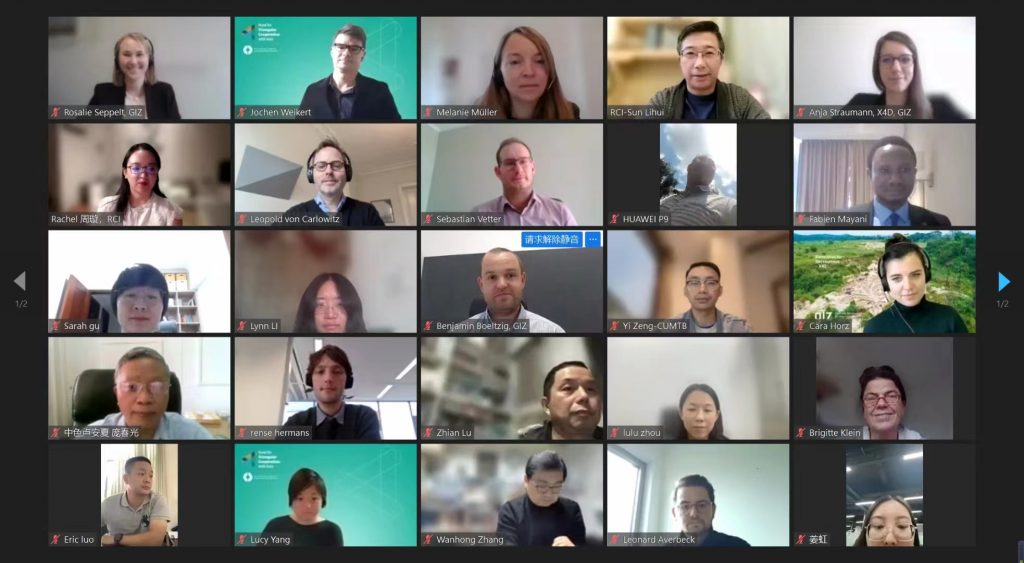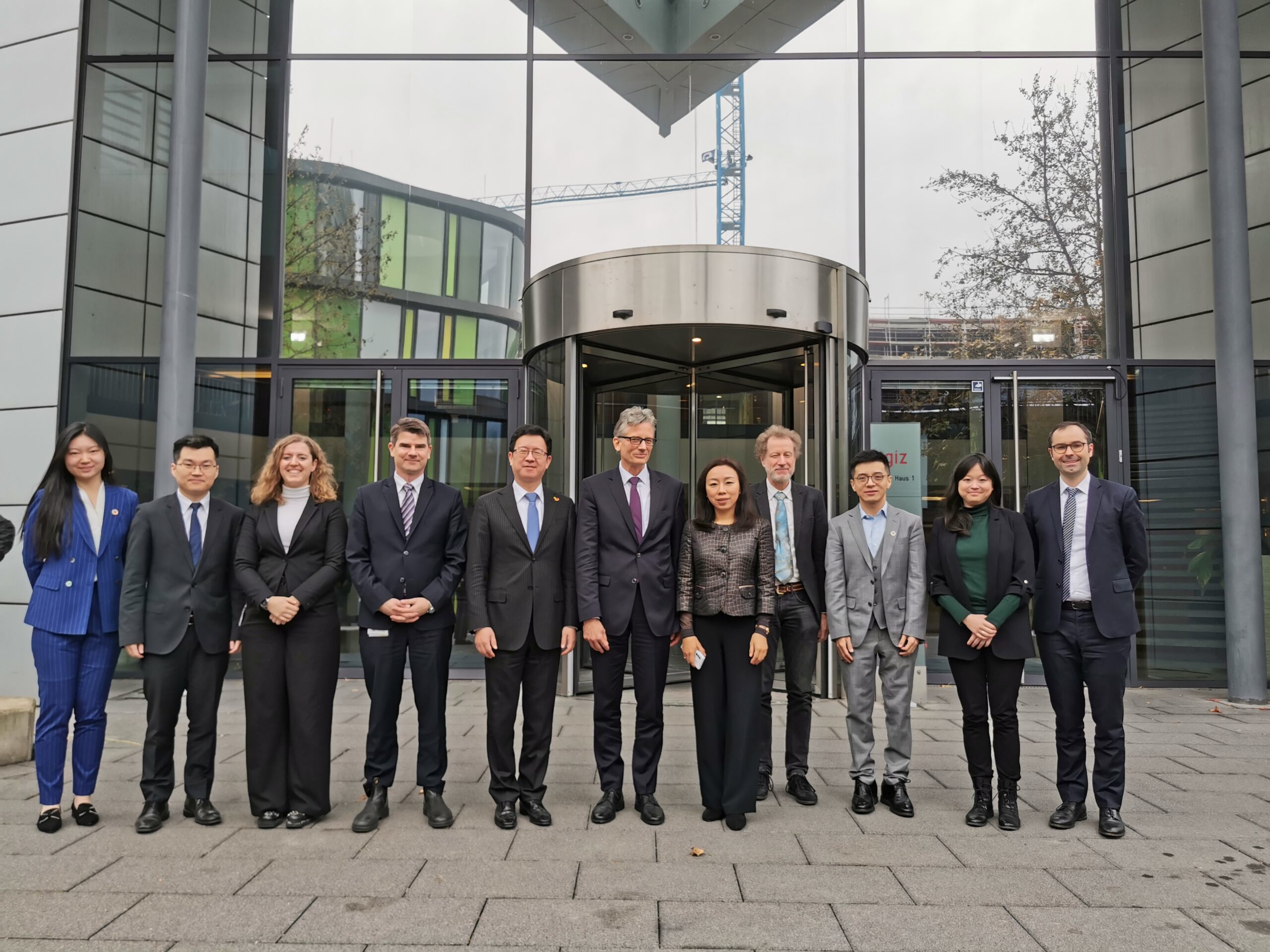On November 24, GIZ sector programme Extractives for Development (X4D) together with the China Chamber of Commerce of Metals, Minerals & Chemicals Importers & Exporters (CCCMC) and the Sino-German Center for Sustainable Development (CSD), organised a webinar on development cooperation perspectives regarding sustainability due diligence in mineral supply chains.
The event formed part of an event series conducted by X4D in cooperation with CSD and CCCMC, supported by the Responsible Cobalt Initiative (RCI). The webinar provided a platform to inform interested stakeholders about different supply chain regulations in China and Germany. Representatives from the Democratic Republic of the Congo (DRC), China and Germany discussed the implementation of sustainability due diligence along mineral supply chains with a country focus on the DRC from a regulatory, civil society, private sector and academic perspective. The event was well attended with an international audience of over 100 participants.
There are several efforts in Germany and in the European Union to regulate corporate due diligence along global supply chains. The German Supply Chain Due Diligence Act will be coming into force by January 2023. Sustainability due diligence is also playing an increasingly important role in China and for economic activities of Chinese mining companies abroad, which is demonstrated by the alignment of the second edition of the Chinese Due Diligence Guidelines for Minerals Supply Chains (published May 2022) with London Metal Exchange Standards.
Yannic Kiewitt, Senior Policy Officer at BMZ, and SUN Lihui, Director of the Development Department at CCCMC Founder of the RCI, opened the event with introductory remarks on the opportunities and challenges of due diligence regulations and the importance of international cooperation. Emphasis was placed on the need for these abstract rules to lead to positive changes on the ground in order to generate sustainable development outcomes.
Dr. Melanie Müller is a senior associate with a focus on Southern Africa at the German Institute for International and Security Affairs (SWP) and project manager of the BMZ-funded research projects “Research Network Sustainable Global Supply Chains” and “Transnational Governance of Sustainable Commodity Supply Chains”. As an introduction to the topic, she gave a brief introduction into the German Supply Chain Due Diligence Act. During her presentation, she pointed out that a level playing field still does not exist at the national level of EU member states and that the German due diligence act will affect countries globally, especially China, through the involvement of suppliers. Finally, she presented important requirements for a successful transnational implementation.
Stefan Crets, Executive Director of CSR Europe, shared practical experiences of implementing due diligence standards in the DRC through the Drive Sustainability initiative and a recent training with various stakeholders in the DRC. He shed light on the perspective of many companies for which implementation poses major challenges and cannot be tackled alone. An exchange of best practices and shared learnings as well as collaboration of companies, governments and civil society is therefore of great importance. Stefan Crets sees the most pressing challenge in overcoming the discrepancy between the downstream due diligence approach and the reality on the ground in producing countries.
Rachel Zhou, Deputy Secretary-General of RCI, introduced the RCI and explained the challenges along raw material supply chains. To secure and establish sustainable supply chains, she presented the initiatives three-way systematic approach of: (1) transparency, (2) sustainability, and (3) extensive partnerships and networks. Emphasis was placed on the importance of standards and collaboration between upstream and downstream stakeholders to manage or mitigate risks along mineral supply chains.
The subsequent panel discussion allowed for an exchange between experts from different vocational backgrounds from China, DRC and Germany on the impact of legal regulations on mining countries and opportunities for joint cooperation. Fabien Mayani, director of the extractive industries governance program at the Carter Center DR Congo and lawyer with a focus on human rights, Ms. LI Mingyue, Supply Chain Due Diligence and Compliance Officer at Hanrui Cobalt, and Sebastian Vetter, Sub Project Manager at the German Federal Institute for Geosciences and Natural Resources (BGR) technical corporation project in DRC, joined Dr. Melanie Müller and Mr. SUN Lihui for this lively discussion. The key points of the discussion were the challenges of implementing due diligence in the local partner countries as well as potential effects of the German Due Diligence Act in the DRC. In addition, the panellists shared insights into practices of different stakeholders and regions.
During his closing remarks, Dr. Jochen Weikert, coordinator of the GIZ cluster “China in the World”, pointed out that further events of this kind will be important in the future, as there is no globally overarching legislation for global supply chains. Therefore, international and cross-stakeholder exchange is and will continue to be of great importance.
The high participation and the great interest in the event encourage the continuation of the format and the further deepening of the cooperation.Virtual event on “Sustainability Due Diligence in Mineral Supply Chains: A development cooperation perspective on regulations and their implementation on the ground”





